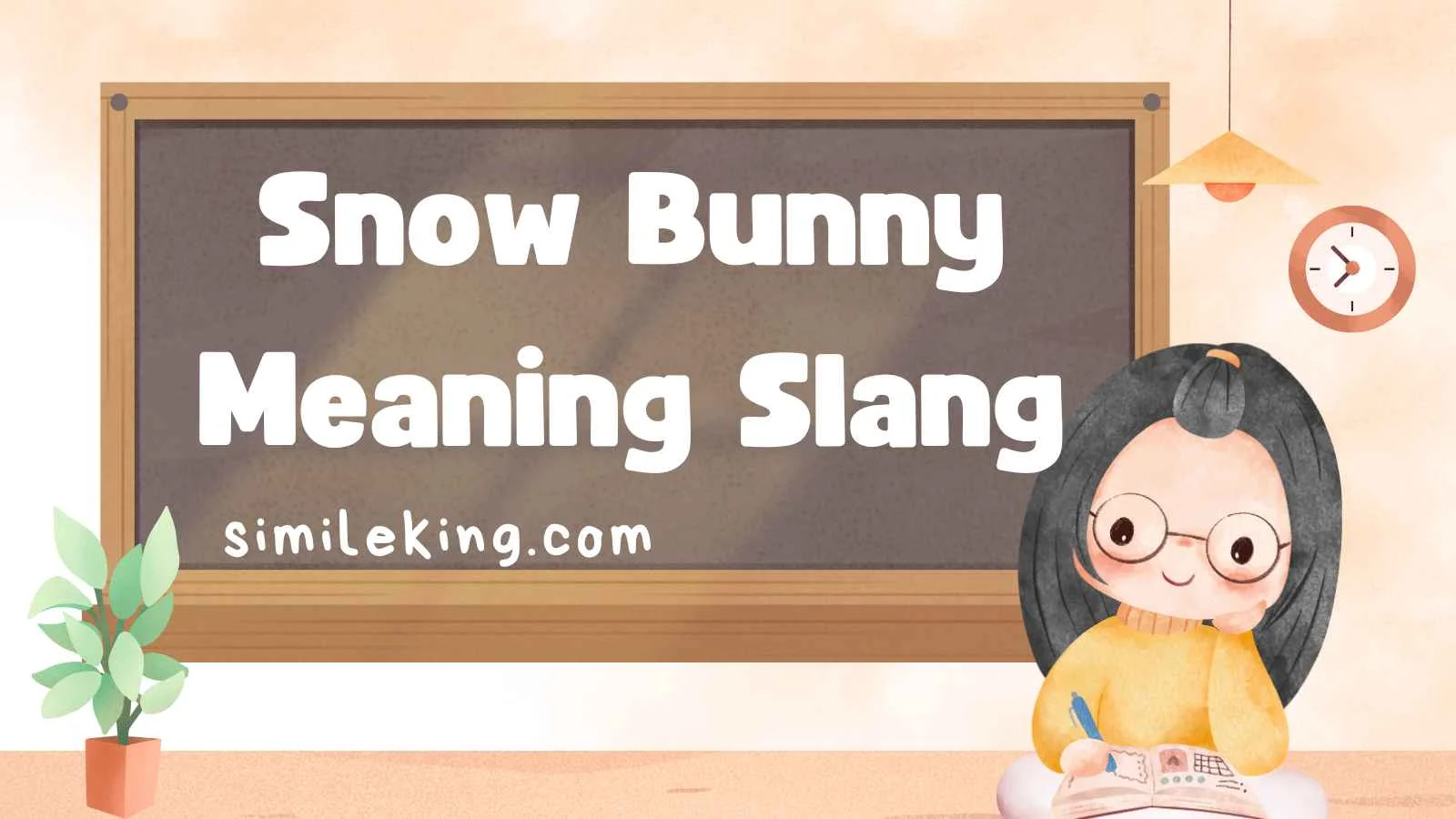Language is always evolving, and slang terms often capture cultural shifts, humor, and social nuances better than formal vocabulary. One phrase that has gained both intrigue and controversy in online and offline spaces is “snow bunny.”
In this in-depth guide, we’ll explore the meaning of “snow bunny” in slang, its origins, how it is used in different contexts, why tone matters, and what alternatives you can use in professional, casual, or polite communication. By the end, you’ll understand not only what the phrase means but also how to navigate it with linguistic finesse in 2025.
What Does “Snow Bunny” Mean in Slang?
At its simplest, the term “snow bunny” has multiple layers of meaning depending on the cultural, social, or conversational context:
- Winter Enthusiast: Traditionally, a “snow bunny” referred to someone who enjoys skiing, snowboarding, or spending time at ski resorts—often a beginner who values style and leisure as much as skill.
- Slang in Dating & Race Contexts: In urban slang, particularly in U.S. hip-hop and street culture, “snow bunny” often refers to a white woman who dates or shows preference for Black men.
- Playful Nickname: Among friends or couples, it can be a lighthearted term of endearment, especially when used to describe someone who enjoys winter or has a playful, cheerful personality.
- Sexualized Connotation: In some conversations, “snow bunny” is used as a mildly sexualized label, sometimes tied to stereotypes about attractiveness and exoticism.
👉 The key takeaway: context shapes meaning. The phrase can be affectionate, neutral, or offensive depending on who is using it, how, and where.
The Origins of “Snow Bunny”
- 1950s Ski Culture: The earliest usage traces back to the mid-20th century, where “bunny” was a playful word for someone new or stylish in skiing. Much like “beach bunny” referred to someone hanging out at the beach, a “snow bunny” was simply a fashionable ski enthusiast.
- Urban Slang Shift (1970s–1990s): By the late 20th century, the term evolved in African American Vernacular English (AAVE) to describe white women dating Black men, gaining traction through hip-hop lyrics and urban storytelling.
- Digital Era (2000s–2020s): Social media amplified its usage. On platforms like TikTok, Instagram, and Twitter, the term took on both playful and controversial spins—sometimes embraced, sometimes criticized.
- 2025 Context: Today, the term exists in multiple layers simultaneously: nostalgic ski slang, modern dating slang, and digital-age meme culture.
Is “Snow Bunny” Offensive?
The answer is: it depends.
- Neutral/Playful: In skiing or winter sports, it’s harmless. Saying “She’s such a snow bunny, always on the slopes!” carries no offense.
- Racial/Dating Context: Here, the phrase can become sensitive. Some embrace it proudly; others find it reductive or fetishizing.
- Professional Settings: In formal or workplace communication, it’s best avoided due to its potential misinterpretation.
👉 Rule of thumb: use it cautiously outside close friends or casual spaces.
Why Tone Matters in Slang
Tone shapes whether slang feels friendly, witty, or offensive. For example:
- Playful tone: “You’re such a snow bunny—skiing every weekend!” (harmless compliment)
- Mocking tone: “She’s just another snow bunny.” (dismissive, potentially derogatory)
- Romantic tone: “My snow bunny always loves cuddling in winter.” (personal and affectionate)
This is why learning alternatives can help you express yourself without risking misunderstanding.
10 Alternatives to “Snow Bunny” (With Examples & Nuance)
If you want to avoid confusion or offense, here are 10 well-chosen alternatives for different tones:
1. Winter Enthusiast
- Polite/Professional: “She’s a winter enthusiast who never misses ski season.”
- Nuance: Highlights passion for winter activities without slang baggage.
2. Ski Lover
- Casual: “He’s a total ski lover—always on the slopes.”
- Nuance: Straightforward, avoids stereotypes, good for conversations with colleagues or acquaintances.
3. Powder Chaser
- Playful/Casual: “You’re such a powder chaser, always hunting fresh snow.”
- Nuance: Ski/snowboard slang, fun but safe.
4. Snow Adventurer
- Neutral/Professional: “She’s a snow adventurer with a passion for alpine travel.”
- Nuance: Works in travel writing or lifestyle blogs.
5. Frost Bunny
- Cute/Endearing: “Good morning, my little frost bunny.”
- Nuance: Keeps the “bunny” charm but softens the racial/dating undertone.
6. Winter Spirit
- Poetic/Formal: “He carries the winter spirit wherever he goes.”
- Nuance: Suitable for creative writing, avoids slang connotations.
7. Cold-Weather Romantic
- Casual/Lighthearted: “She’s such a cold-weather romantic—loves hot cocoa and snowfall dates.”
- Nuance: Gentle, cozy, and affectionate.
8. Alpine Explorer
- Professional/Travel Writing: “Our alpine explorers discovered breathtaking trails.”
- Nuance: Strong for professional or adventurous tone.
9. Snow Enthusiast
- Neutral: “He’s always been a snow enthusiast.”
- Nuance: A safe catch-all replacement.
10. Winter Bunny
- Playful/Romantic: “Happy birthday to my winter bunny!”
- Nuance: Keeps the cuteness, less culturally loaded than “snow bunny.”
How to Choose the Right Expression
When deciding whether to use “snow bunny” or an alternative, consider:
- Audience: Friends vs. colleagues vs. strangers.
- Setting: Online banter, workplace, romance, or creative writing.
- Tone: Do you want playful, neutral, romantic, or professional vibes?
- Cultural Sensitivity: Avoid slang if there’s risk of offense.
👉 A safe strategy in 2025: default to neutral or professional alternatives in public communication, and reserve playful terms for private contexts.
Advanced Examples of Usage in Different Tones
Here are 10 polished examples of how you can apply or replace the phrase effectively:
- Polite:
- “She’s a winter enthusiast who enjoys alpine resorts.”
- Professional:
- “Our travel guide highlights the best destinations for snow adventurers.”
- Casual:
- “He’s a total powder chaser—always first on the slopes.”
- Playful:
- “You’re my little frost bunny; you look adorable in that scarf.”
- Romantic:
- “Every snowfall makes me think of my winter bunny.”
- Neutral:
- “She’s a snow enthusiast who loves capturing winter photography.”
- Affectionate:
- “Goodnight, my cozy cold-weather romantic.”
- Lighthearted:
- “He’s the ultimate ski lover—never misses a chance to hit the slopes.”
- Creative Writing:
- “The alpine explorer carved her path across untouched snowfields.”
- Safe Social Media Post:
- “Winter spirit activated ❄️—bring on the snowy adventures!”
Final Thoughts
The slang term “snow bunny” is a perfect example of how language evolves, shifting from lighthearted ski slang to racially loaded urban slang and into modern meme culture. In 2025, using it requires awareness of tone, audience, and context.
By understanding its meanings and having a set of professional, casual, and romantic alternatives, you can communicate clearly, stylishly, and respectfully—while avoiding potential misunderstandings.





